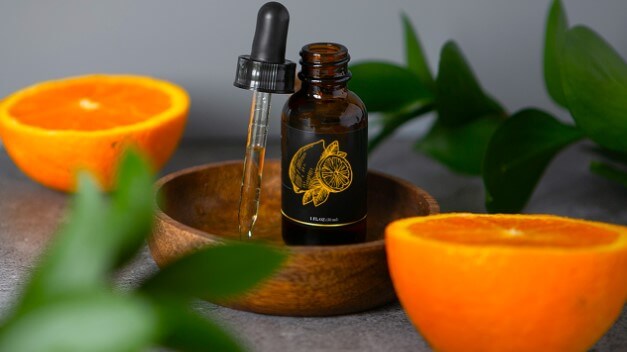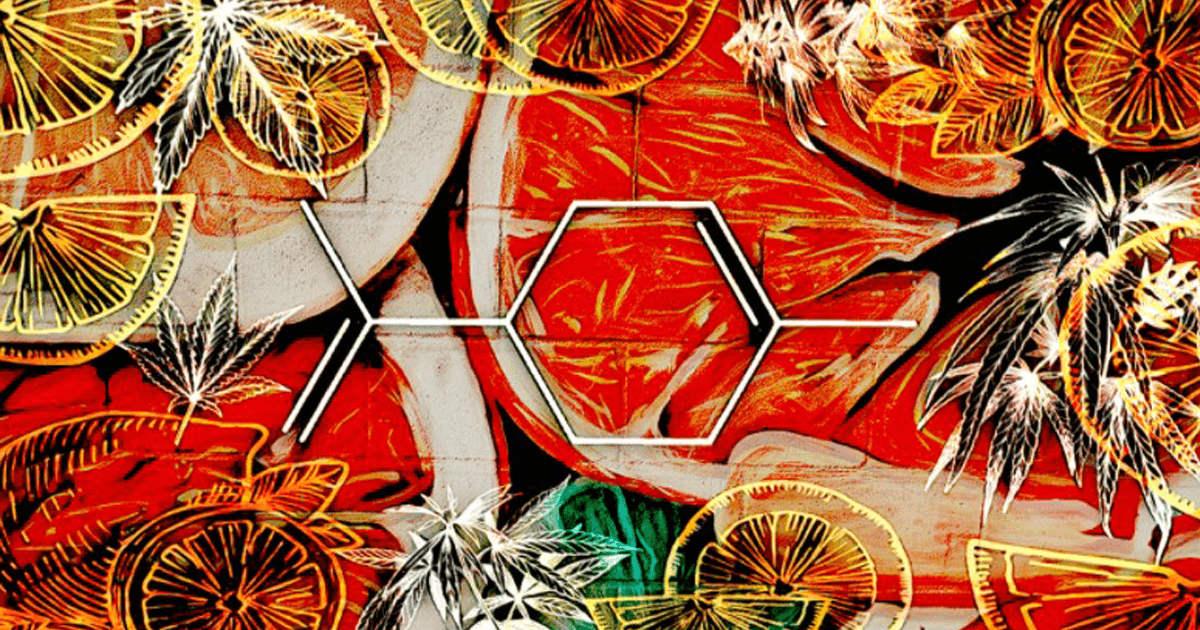WHAT IS LIMONENE?
Yet another sweet-smelling monoterpene, limonene is again omnipresent within the cannabis plant — in some cases making up as much as 16% of its essential oil composition in some varieties. In her TEDx talk, recent DELTA 8/9 SHIFT guest Mara Gordon says, “If you’ve ever picked a lemon and held it to your nose and smelled it and had that uplifting feeling that it gives you — that’s limonene.”
Not only does it smell sweet, but it’s also been explored for several health challenges, due to its low toxicity. It’s also used as a pesticide in many products meant to repel fleas and ticks on dogs and cats. Its presence in several cannabis strains has long suggested a force multiplier of potential salutary effects, and while more studies are needed, one can’t deny some very good news to come from the exploration we’ll be seeing surrounding these combinations in the years to come.

CAN BE FOUND IN…
Almost all citrus fruits, as well as resins such as terebinth and pine nuts. It is considered the second most widely distributed terpene in nature, so cannabis is not the only place you can find it. But the potential synergies it forms with other compounds within the plant, both positive and negative, are unique to it.
LIMONENE-RICH CANNABIS STRAINS
- Banana Kush
- Banana OG
- Berry White
- Black Cherry Soda
- Cinex
- Do-Si-Dos
- Goji OG
- MAC
- Purple Hindu Kush
- Quantum Kush
- Strawberry Banana
- Tahoe OG
- Wedding Cake
- White Fire OG
- White Widow
DID YOU KNOW…
Historically, lemons have been used as an antidote for THC overdoses. It was recommended throughout the 19th and early 20th century, and lemon rind and lemon juice found in Moroccan drinks is considered a sort of folk remedy for hash hangovers in the region.
EFFECTS OF LIMONENE

Anti Inflammatory: In an animal model study examining limonene’s potential in decreasing gentamicin’s toxic effects on the liver, limonene exhibited significant activity against gentamicin-induced inflammation, as well as antioxidant properties as well.
Antifungal: Ever heard of dermatophytes? They are particularly bad news, as they can cause infections of hair, nail, and skin, and even lead to ringworm. Citrus essential oils containing limonene have proved quite effective in the battle against them. Because of its powerful antimicrobial properties, limonene is often used in many cleaning materials, caused by oxidation.
Antioxidant: While it didn’t involve cannabis, one citrus essential oil study found that the presence of terpenoids found in the same proportions found in the plant was effective in scavenging “free radicals” within the body. In addition, its performance as an antioxidant with lens epithelial cells suggests a role in the fight against cataracts.
Anti-anxiety: A mouse study found increases of both serotonin in the prefrontal cortex and dopamine in the hippocampus through the 5HT1a receptor, a receptor that has been tied to stoical tolerance of stress.
Anti-acne: Again, essential oils to the rescue: limonene-rich oils have inhibited the formation of one of acne’s most prevalent pathogens, Propionibacterium acnes, in one study. This, alongside preliminary evidence of CBD’s reduction of sebum, could mean a possible application against breakouts.
Antidepressant: A 1995 study that examined the effects of ambient air suffused with limonene-enriched citrus fragrance found unique effects amongst a small group of hospitalized depressed patients. Amongst them were immune stimulation and even discontinuation of medication in nine out of 12 patients.
Antibiotic: Limonene had demonstrated effects against S. aureus and Pseudomonas aeruginosa. In addition, it also suppresses the formation of biofilms that protect harmful bacteria such as Streptococcus pyogenes SF370 and S. nutans, which can form in hospitals, food production facilities, and water supplies.
Anticancer: While limonene does NOT cure cancer, its effectiveness in various studies deserves some remark. Amongst the findings are apoptosis in breast cancer cells as well as colon cancer cells from a blood orange volatile emulsion.
POTENTIAL ALLERGIES/TOXICITIES
While certain isomers and mixtures of limonene are irritants at very high concentrations, smaller concentrations are usually innocuous. A Finnish study that tested 511 subjects found that 21 of those tested with varying concentrations of limonene responded, nine strongly. These, however, were patch tests on the skin, rather than smoked or vaporized terpenes. Limonene naturally occurs in many foods people eat; the EPA classifies the terpene as GRAS (Generally Recognized as Safe) as a food additive, so edibles are a-OK.
IN THE FUTURE
Potential synergies with the appetite-suppressant qualities of THCV and CBD have been suggested, as some of the observed mechanisms of action for limonene suggest anti-obesity tendencies (It should also be remarked, however, that in a rat colitis model, a limonene formulation reduced weight loss.). In addition, limonene acts as an agonizer of the A2A Adenosine receptor, which creates potential synergistic effects with both THC and CBD.

Medicine Box is your one-stop shop for the highest quality cannabis goods, heritage, and wisdom. Together, we share a common goal of cannabis culture preservation and ongoing education.
Read more Medicine Box / Beard Bros collaborations HERE
You can learn more about Medicine Box – and sign up for a free course on terpenes – HERE
- Ohio’s Senate Bill 56 Postponed, Leaving Details of Issue 2 Still Unresolved
- Sports Stars and Well Known Entertainers Join Forces Calling on Trump for Cannabis Reform
- Pinsky and the Brain: Bill White on His Journey to Consulting in Cannabis
- Delaware’s Recreational Cannabis Market Finally Set to Launch After Years of Challenges
- Excise Tax Increase to 19% and Its Impact on California Retailers
- Nebraska’s Governor Approves Emergency Medical Cannabis Regulations













